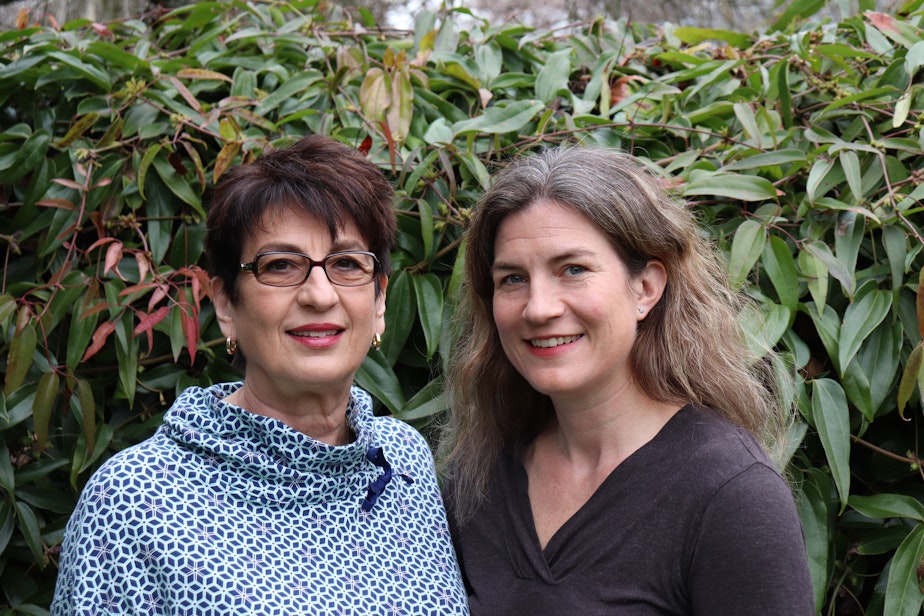Seattle Covid vaccine study participants finding out if they got the real deal

W
as it a shot of salty water, or the real deal?
Last month, Karen and Carmen Mikacenic compared notes. The mother-daughter pair received two doses of something as part of a local trial site for the Pfizer vaccine study.
They were two of hundreds of Seattle-area people who may have received Covid vaccines as volunteers in research trials. Karen and Carmen are close, and they’ve been talking about their experiences in the study as it’s gone forward.
“Now it's just ‘Gosh, I wonder. I wonder what we got,’” daughter Carmen, 40, said.
Sponsored
“We don't know,” mother Karen, 68, said.
The day before we spoke in mid-December over a three-way Zoom call, Carmen had received an email from the research study.
The next time participants came in for a visit as part of the study, they could decide whether to “crossover” – get the real vaccine – if they had gotten the placebo. Karen’s next visit isn’t until March.
“Well, I’ve waited this long. March isn’t that far off,” Karen said.
But Carmen found out the next day. She was excited.
Sponsored
“I can’t believe I’ve been vaccinated since late September,” Carmen said.
'I trust in the system of science'
The Western Washington Pfizer study site is located at the Benaroya Research Institute at Virginia Mason. Dr. Carla Greenbaum, a research director, and her team wanted to help with the pandemic — and it just so happens that the immune system is their area of expertise.
In pre-pandemic times, the institute studies type 1 diabetes, which is an autoimmune disease. These days, scientists are trying to understand Covid-19 — from which cells in the body target the virus, to how the disease affects the lungs.
When Greenbaum learned of the Pfizer vaccine trial, she reached out to people at the company she knew.
Sponsored
“They of course, had nothing to do with the vaccine, but they connected me to the people to connect me to the people,” she said.
The study began sending out emails and searching for frontline medical workers who would volunteer. There was no problem at all finding them, Greenbaum said, and soon they had way more people than they could accommodate.
Health care workers at Children’s Hospital and Harborview were among those who signed up, Greenbaum said.
“Not just people who are caring for patients, but people who are intubating people acutely, and people that are in the ER at other institutions, who really had no other way to potentially get early access,” Greenbaum said. “I think that was really an important service for the community here.”
One of those recruitment emails landed in the inbox of, Carmen, who also researches Covid-19 and the immune system at the Benaroya Research Institute. Carmen responded right away, and she forwarded it to her mom.
Sponsored
“I was excited and said, ‘Oh, I want to do that, too!” Karen said.
Neither had any hesitations — it seemed worth the risk, which Carmen thought was low.
“I trust in the system of science,” Carmen said. “I knew that even if something did go wrong for one of us, it would benefit the study and the knowledge of the vaccine.”
Carmen has been an ICU doctor for ten years. These days, as her mom watches her children, ages 7 and 10, Carmen goes into the ICU to collect samples — jars of mucus suctioned out of an ICU patient’s ventilator tube and blood for — her research on why some patients become so much sicker with Covid than others.
But mom Karen is more worried about her daughter before work.
Sponsored
“It’s the way she transports herself to work because we live in West Seattle and the West Seattle Bridge is out of commission,” Karen said. “I’ve been riding an e-bike,” Carmen said. “So, I think what my mom’s saying is that she’s most worried about me commuting on my e-bike to work.”
“Yeah, make sure you have the bright yellow fluorescent on!” Karen said, laughing.
For both of them, participating in the Pfizer study was a lot like getting a flu shot, plus a Covid test and a long wait.
During their visits, Karen and Carmen waited about 30 minutes for the doses of the vaccine to be prepared and come up from the pharmacy. In the meantime, Carmen took a conference call (“I feel like I'm always working,” she said) and Karen played Pokémon GO through the hospital window.
“You can sure find them out on the street,” she said. “It was a treat.”
Then came the injection: “Just a pinch on the arm,” Karen said.
Neither experienced any reaction, apart from minor soreness.
Being a volunteer in the study is an involved, two-year commitment that includes reporting any symptoms they experience, such as coughing during the epic wildfire smoke in Washington last September.
“People started coughing,” Greenbaum said. “Well, they then had to report that to us, we had to then work them up, and do all the testing. So it wasn't just a question of giving them their shots, right?”
Even if someone decides to find out if they got the vaccine or the placebo — and then get the vaccine, if they want it — they can continue to be part of the study and have their health status monitored.
Karen and Carmen have been watching with excitement and wonder as people in Seattle have started to get their Covid shots too.
Karen’s friend insists she’s a hero for stepping up to test out a Covid vaccine, Karen said.
“I don't feel like a hero,” she said. ““I feel like I just donated my arm for a test and [we'll] see what the results will bring."
Her daughter feels differently, though.
“I always think my mom's a hero,” Carmen said. “This is just one more example.”




